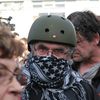22.1.2009 | 20:43
Bréf 8 ísraelskra mannréttindasamtaka til ríkissaknara Ísraels međ ósk um rannsókn á mannréttindabrotum IDF á Gaza.
20 January 2009
Mr. Meni Mazuz
Attorney General
Re: Mechanism to Investigate Harm to Gaza Civilians:
Suspicion of Grave Violations of the Laws of War
Dear Mr. Mazuz,
- 1. We write to you in your capacity as head of law enforcement in the State of Israel, requesting that you establish a mechanism to conduct independent and effective investigation of acts carried out by Israeli security forces which are suspected of violating humanitarian law and that resulted in the killing or harming of civilians in the Gaza Strip.
- 2. This request is submitted in the name of the Association for Civil Rights in Israel, Bimkom, B'Tselem, Gisha, Hamoked Center for the Defense of the Individual, the Public Committee against Torture in Israel, Yesh Din, and Physicians for Human Rights - Israel.
- 3. Since 27 December 2008, when the IDF began a military operation in the Gaza Strip referred to as "Cast Lead", we have witnessed severe and extensive harm to and casualties among the civilian population. According to reports from the Palestinian Ministry of Health, by 19 January 2009, at least 1,300 people were killed in Israel Defense Forces (IDF) attacks, of whom 410 were children and 104, women. Thirteen medical personnel were among those killed. Since ground troops entered Gaza, at least 845 people were killed, more than half of them women and children. Wounded during these attacks were 5,300 people, of whom 1,855 were children and 795, women. More than 300 of these were seriously injured.
- 4. From information received to date from a number of sources, it appears that buildings in which many civilians were located, including women and children, were attacked and bombed by the IDF. In some attacks, dozens of civilians were killed in a single location. It is important to emphasize that the information that currently exists is only partial. However, even this partial information is sufficient to justify the need for an investigation. This investigation must be independent and exhaustive.
- 5. Events already known, for which information is accumulating daily, as well as the proportion of children and women killed, raise serious concerns that Israel did not conduct itself in accordance with its declarations and violated fundamental principles of international law.
- 6. The two basic precepts of humanitarian law are the principle of discriminating between combatants and civilians and the principle of proportionality. These principles are intended to serve the overarching goal of humanitarian law: minimizing the suffering of civilians during armed conflict.
- 7. Accordingly, international law prohibits attack on civilian targets and stipulates that attacks be strictly limited to military targets, meaning "objects which by their nature, location, purpose or use make an effective contribution to military action and whose total or partial destruction, capture or neutralization, in the circumstances ruling at the time, offers a definite military advantage" (Article 52 (2) of the First Protocol).
- 8. It is the obligation of a warring party to distinguish between military and civilian targets. "In case of doubt," notes the law, "whether an object which is normally dedicated to civilian purposes, such as a place of worship, a house or other dwelling or a school, is being used to make an effective contribution to military action, it shall be presumed not to be so used," hence, attacking it is prohibited (Article 52 (3) of the First Protocol).
- 9. Indiscriminate attacks are prohibited by international law. Indiscriminate attacks are defined as those which, inter alia, "employ a method or means of combat which cannot be directed at a specific military objective; or those which employ a method or means of combat the effects of which cannot be limited as required by this Protocol" (Article 51(4)(b-c) to the First Protocol). Even for military targets, the risk to civilians and civilian facilities must be taken into account during planning and execution. An attack that "may be expected to cause incidental loss of civilian life, injury to civilians, damage to civilian objects, or a combination thereof, which would be excessive in relation to the concrete and direct military advantage anticipated" is considered indiscriminate and hence prohibited (Article 51(5)(b) of the Protocol).
- 10. International law also stipulates that "In the conduct of military operations, constant care shall be taken to spare the civilian population, civilians and civilian objects" (Article 57(1) of the First Protocol). Indeed, "an attack shall be cancelled or suspended if it becomes apparent that the objective is not a military one...or may be expected to cause incidental loss of civilian life, injury to civilians, damage to civilian objects, or a combination thereof, which would be excessive in relation to the concrete and direct military advantage anticipated" (Article 57(2)(b) of the First Protocol).
- 11. The shooting of rockets by Hamas into Israel that is not directed against a military target, but intended to harm civilians, is a serious violation of international law. Prohibited too is the use of civilians as "human shields" or the carrying out of attacks from within populated areas. As is known, however, these do not entitle Israel to violate international law and they do not exempt it from the law's prohibitions. As made clear in Article 51(8) of the First Protocol, which deals with the protection of a civilian population:
Any violation of these prohibitions shall not release the Parties to the conflict from their legal obligations with respect to the civilian population and civilians, including the obligation to take the precautionary measures provided for in Article 57.
- 12. The Gaza Strip is known to be one of the most densely populated regions of the world. A significant portion of the IDF bombardment of Gaza included air strikes at targets in the midst of or in close proximity to a civilian population. Some of these attacks are intended to damage or destroy structures that ordinarily serve civilian needs.[1] These protected sites cannot be attacked on the basis of a general suspicion, but only on well-founded information, and even then, the risk to civilians must be taken into account both during the planning and execution of the action. It must be emphasized that the presence of armed individuals among a civilian population does not negate its civilian character, nor does it justify an attack on it (Article 50(3) of the First Protocol).
- 13. Moreover, those who take decisions about attacking targets in or near densely populated areas know that they are placing many civilians in mortal danger. Warning people before an attack does not exempt them from responsibility. This is particularly the case in the special circumstances of the Gaza Strip, in which the population is trapped in a small area, its exit blocked by Israel. As we have seen in incidents about which details have already been made public, the IDF did not refrain from attacking even locations where people gathered who had fled their homes to seek shelter from the shelling and warfare. Thus, this was not a theoretical danger, but a danger expected and known to the decision-makers. Such patterns of activity, as noted, led to the killing and wounding of many civilians.
- 14. Carrying out attacks in the midst of or in close proximity to an area densely populated with civilians using arms or methods of warfare that do not distinguish between military and civilian targets, together with accumulating data about the significant number of children and women among those killed and wounded and the damage to civilian infrastructure, raise serious suspicions about grave violations by Israel of international humanitarian law.
- 15. Official declarations as well as accumulating data indicate that, in general, the harm to civilians and civilian structures is not the product of any one on-site decision, but of decisions and directives issued at the highest levels of government and the IDF, and with the approval of the Judge Advocate General (JAG).[2] Among the practices that contravene the laws of war, and for which information is accumulating of their perpetration by Israel during the Gaza Strip fighting, are the following:
- a. Permitting the use of non-discriminating weapons in densely populated areas;
- b. Failing to take precautionary measures to prevent harm to civilians and civilian buildings;
- c. Executing attacks that could be expected to cause harm to civilians that is excessive in relation to the concrete and direct military advantage expected;
- d. Attack of protected civilian structures;
- e. Widespread destruction of private property not necessary for mandatory military needs;
- f. Attack of medical personnel; and
- g. Preventing the removal and evacuation of the injured.
- 16. It is incumbent upon the law enforcement authorities of the State of Israel to initiate an independent and effective investigation into cases in which there are suspected violations of humanitarian law by its officers and soldiers, for which they are criminally liable. The obligation to conduct an investigation is drawn from international humanitarian law that obligates the investigation of claims concerning the execution of war crimes, international human rights law, and Israeli law.
- 17. In light of previous experience in which the obligation to conduct an investigation was not realized,[3] we are submitting our request to you at an early stage so that you can establish a mechanism for investigating suspected cases of humanitarian law violations by IDF officers and soldiers. These investigations must also address the legality of the actual orders and directives given to forces in the field, both during their training and during the action itself. It is essential that neutral parties be appointed to this investigating body, including those whose expertise and independence is beyond doubt.
- 18. We are submitting this request to the office of the Attorney General and not the JAG because, inter alia, the involvement of JAG personnel and the JAG himself during stages of decision-making does not allow for the JAG's appointment as an investigating figure.[4] Appointment of the JAG would conflict with the need for independence and neutrality, criteria that a proper investigation must meet. Furthermore, investigations previously conducted by Israel in cases of suspected grave violations of international humanitarian law were seriously flawed.[5]
- 19. We would appreciate your expeditious response to this request.
Yours very truly,
Limor Yehuda, Atty.
CC: Mr. Ehud Olmert, Prime Minister
Mr. Ehud Barak, Defense Minister
Ms. Tzipi Livni, Foreign Minister
Brig. Gen. Avichai Mandelblit, Military Advocate General,
[1] See the intervention submitted to you on 4 January 2009 concerning the bombardment of government buildings in the Gaza Strip that was sent by Adalah, along with the Association for Civil Rights in Israel and other human rights organizations.
[2] Paragraph 3 of the letter (18 January 2009) from Brig. Gen. Avichai Mandelblit, the Judge Advocate General, to Attorney Fatmeh El-‘Ajou notes that IDF actions were accompanied by legal counsel from the JAG and that the general principles of this counsel were even approved by you.
[3] See the claims and data brought by the petitioners in HCJ 9594/03 B'Tselem and the Association for Civil Rights in Israel v. Judge Advocate General, a case that is still pending.
[4] See the Report of the (Winograd) Commission of Inquiry into the Lebanon Campaign of 2006, Final Report (January, 2008), Chapter 14, p. 492.
[5] Based on investigations conducted by Human Rights Watch, Israeli investigations of the shelling of Qana on 29 July 2007 during the Second Lebanon War, and the IDF invasion of the Jenin refugee camp during Operation Defensive Shield in April 2002 were both marked by serious distortions.
Flokkur: Stjórnmál og samfélag | Facebook


 dolli-dropi
dolli-dropi
 malacai
malacai
 bjarnihardar
bjarnihardar
 brandurj
brandurj
 ea
ea
 killjoker
killjoker
 coke
coke
 vglilja
vglilja
 gudrunmagnea
gudrunmagnea
 neytendatalsmadur
neytendatalsmadur
 veravakandi
veravakandi
 hehau
hehau
 gorgeir
gorgeir
 hlynurh
hlynurh
 disdis
disdis
 ingabesta
ingabesta
 jevbmaack
jevbmaack
 palmig
palmig
 joiragnars
joiragnars
 manisvans
manisvans
 stebbifr
stebbifr
 svanurg
svanurg
 vefritid
vefritid
 vestfirdir
vestfirdir
 para
para
 hreinsamviska
hreinsamviska
 kreppukallinn
kreppukallinn
 veffari
veffari
 arnith
arnith
 icekeiko
icekeiko
 andres08
andres08
 skagstrendingur
skagstrendingur
 gattin
gattin
 skulablogg
skulablogg
 haugur
haugur
 heimssyn
heimssyn
 snjolfur
snjolfur
 kreppan
kreppan
 kamasutra
kamasutra
 ksh
ksh
 larahanna
larahanna
 raudurvettvangur
raudurvettvangur
 siggisig
siggisig
 siggith
siggith
 lehamzdr
lehamzdr
 vest1
vest1
 iceberg
iceberg





Bćta viđ athugasemd [Innskráning]
Ekki er lengur hćgt ađ skrifa athugasemdir viđ fćrsluna, ţar sem tímamörk á athugasemdir eru liđin.